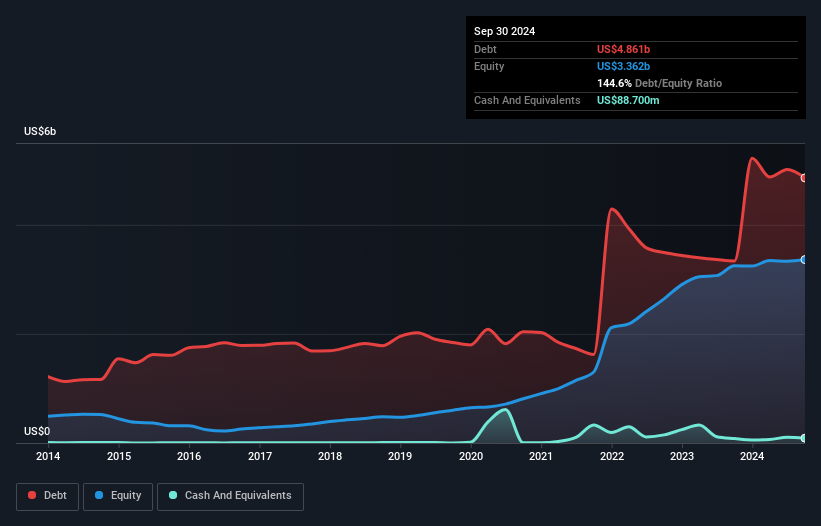- United States
- /
- Specialty Stores
- /
- NYSE:ABG
Asbury Automotive Group (NYSE:ABG) Has A Somewhat Strained Balance Sheet

Legendary fund manager Li Lu (who Charlie Munger backed) once said, 'The biggest investment risk is not the volatility of prices, but whether you will suffer a permanent loss of capital.' So it seems the smart money knows that debt - which is usually involved in bankruptcies - is a very important factor, when you assess how risky a company is. Importantly, Asbury Automotive Group, Inc. (NYSE:ABG) does carry debt. But is this debt a concern to shareholders?
Why Does Debt Bring Risk?
Debt assists a business until the business has trouble paying it off, either with new capital or with free cash flow. Ultimately, if the company can't fulfill its legal obligations to repay debt, shareholders could walk away with nothing. However, a more usual (but still expensive) situation is where a company must dilute shareholders at a cheap share price simply to get debt under control. Of course, the upside of debt is that it often represents cheap capital, especially when it replaces dilution in a company with the ability to reinvest at high rates of return. When we examine debt levels, we first consider both cash and debt levels, together.
View our latest analysis for Asbury Automotive Group
What Is Asbury Automotive Group's Debt?
You can click the graphic below for the historical numbers, but it shows that as of September 2024 Asbury Automotive Group had US$4.86b of debt, an increase on US$3.34b, over one year. And it doesn't have much cash, so its net debt is about the same.

How Healthy Is Asbury Automotive Group's Balance Sheet?
The latest balance sheet data shows that Asbury Automotive Group had liabilities of US$2.59b due within a year, and liabilities of US$4.22b falling due after that. Offsetting these obligations, it had cash of US$88.7m as well as receivables valued at US$259.0m due within 12 months. So it has liabilities totalling US$6.46b more than its cash and near-term receivables, combined.
Given this deficit is actually higher than the company's market capitalization of US$5.10b, we think shareholders really should watch Asbury Automotive Group's debt levels, like a parent watching their child ride a bike for the first time. In the scenario where the company had to clean up its balance sheet quickly, it seems likely shareholders would suffer extensive dilution.
We measure a company's debt load relative to its earnings power by looking at its net debt divided by its earnings before interest, tax, depreciation, and amortization (EBITDA) and by calculating how easily its earnings before interest and tax (EBIT) cover its interest expense (interest cover). Thus we consider debt relative to earnings both with and without depreciation and amortization expenses.
Asbury Automotive Group's debt is 4.5 times its EBITDA, and its EBIT cover its interest expense 3.9 times over. Taken together this implies that, while we wouldn't want to see debt levels rise, we think it can handle its current leverage. Another concern for investors might be that Asbury Automotive Group's EBIT fell 14% in the last year. If that's the way things keep going handling the debt load will be like delivering hot coffees on a pogo stick. There's no doubt that we learn most about debt from the balance sheet. But ultimately the future profitability of the business will decide if Asbury Automotive Group can strengthen its balance sheet over time. So if you want to see what the professionals think, you might find this free report on analyst profit forecasts to be interesting.
Finally, a company can only pay off debt with cold hard cash, not accounting profits. So we always check how much of that EBIT is translated into free cash flow. In the last three years, Asbury Automotive Group's free cash flow amounted to 38% of its EBIT, less than we'd expect. That's not great, when it comes to paying down debt.
Our View
To be frank both Asbury Automotive Group's EBIT growth rate and its track record of staying on top of its total liabilities make us rather uncomfortable with its debt levels. But at least its conversion of EBIT to free cash flow is not so bad. Overall, it seems to us that Asbury Automotive Group's balance sheet is really quite a risk to the business. For this reason we're pretty cautious about the stock, and we think shareholders should keep a close eye on its liquidity. There's no doubt that we learn most about debt from the balance sheet. But ultimately, every company can contain risks that exist outside of the balance sheet. For example, we've discovered 4 warning signs for Asbury Automotive Group (1 is concerning!) that you should be aware of before investing here.
When all is said and done, sometimes its easier to focus on companies that don't even need debt. Readers can access a list of growth stocks with zero net debt 100% free, right now.
New: Manage All Your Stock Portfolios in One Place
We've created the ultimate portfolio companion for stock investors, and it's free.
• Connect an unlimited number of Portfolios and see your total in one currency
• Be alerted to new Warning Signs or Risks via email or mobile
• Track the Fair Value of your stocks
Have feedback on this article? Concerned about the content? Get in touch with us directly. Alternatively, email editorial-team (at) simplywallst.com.
This article by Simply Wall St is general in nature. We provide commentary based on historical data and analyst forecasts only using an unbiased methodology and our articles are not intended to be financial advice. It does not constitute a recommendation to buy or sell any stock, and does not take account of your objectives, or your financial situation. We aim to bring you long-term focused analysis driven by fundamental data. Note that our analysis may not factor in the latest price-sensitive company announcements or qualitative material. Simply Wall St has no position in any stocks mentioned.
About NYSE:ABG
Asbury Automotive Group
Operates as an automotive retailer in the United States.
Undervalued slight.
Similar Companies
Market Insights
Community Narratives



